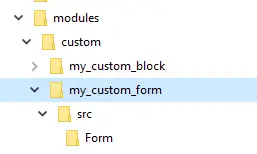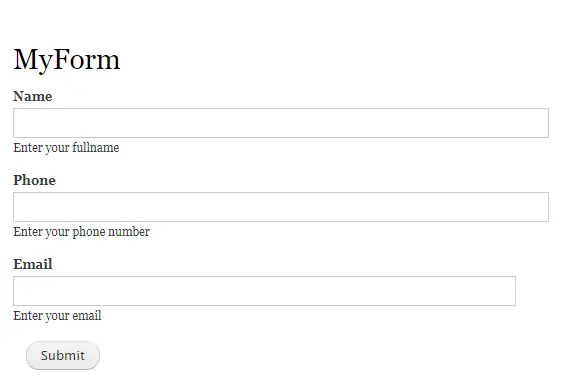In this post, we will discuss how can we create a custom form in Drupal 8. If you have already worked in Drupal 7, it’s totally different in Drupal 8.
First you need to create a custom module to create a form. To create a module in Drupal 8 is so simple.
1) Creating a module
Go to your drupal path and create a folder called ‘my_custom_form’: /drupal8/module/my_custom_form
then, create a file
my_custom_form.info.yml
name: 'my_custom_form' type: module description: 'Custom form using a custom module' core: 8.x package: 'Custom'
Now you have created a module, go to “Extends” and enable the module.
2) Creating a form
We have a module now, so let’s create a custom form.
Go to the path: /drupal8/module/my_custom_form and create a route file:
i) my_custom_form.routing.yml
my_custom_form.my_form:
path: '/myform'
defaults:
_form: '\Drupal\my_custom_form\Form\MyForm'
_title: 'MyForm'
requirements:
_access: 'TRUE'
After creating the above file, create two folders src and Form inside my_custom_form, So the structure would look like this now,
Inside the ‘Form’ folder create a PHP Class and put the below code:
ii) MyForm.php
<?php
namespace Drupal\my_custom_form\Form;
use Drupal\Core\Form\FormBase;
use Drupal\Core\Form\FormStateInterface;
/**
* Class MyForm.
*/
class MyForm extends FormBase {
/**
* {@inheritdoc}
*/
public function getFormId() {
return 'my_form';
}
/**
* {@inheritdoc}
*/
public function buildForm(array $form, FormStateInterface $form_state) {
$form['name'] = [
'#type' => 'textfield',
'#title' => $this->t('Name'),
'#description' => $this->t('Enter your fullname'),
'#maxlength' => 64,
'#size' => 64,
'#weight' => '0',
];
$form['phone'] = [
'#type' => 'textfield',
'#title' => $this->t('Phone'),
'#description' => $this->t('Enter your phone number'),
'#maxlength' => 64,
'#size' => 64,
'#weight' => '0',
];
$form['email'] = [
'#type' => 'email',
'#title' => $this->t('Email'),
'#description' => $this->t('Enter your email'),
'#weight' => '0',
];
$form['submit'] = [
'#type' => 'submit',
'#value' => $this->t('Submit'),
];
return $form;
}
/**
* {@inheritdoc}
*/
public function validateForm(array &$form, FormStateInterface $form_state) {
parent::validateForm($form, $form_state);
}
/**
* {@inheritdoc}
*/
public function submitForm(array &$form, FormStateInterface $form_state) {
// Display result.
foreach ($form_state->getValues() as $key => $value) {
drupal_set_message($key . ': ' . $value);
}
}
}
Just go through above code, to create a form, you need to extend “FormBase” core class and an interface
use Drupal\Core\Form\FormBase;
use Drupal\Core\Form\FormStateInterface;
When you use FormStateInterface, you should use the following functions as well getFormId(), buildForm() and submitForm() without these function a form cannot be created.
getFormId() – this is where you have to mention your form id and it should be unique
buildForm() – this is where you will create your form
validateForm() – here you can write your form validations
submitForm() – this is where you can handle submit processes
Now you have your custom module and a custom Form created, as we have already enabled the module just clear cache and access the path https://localhost/drupal/myform to see your custom form
For your convenience, I attached the entire module here, click the below link to download the module.



